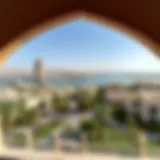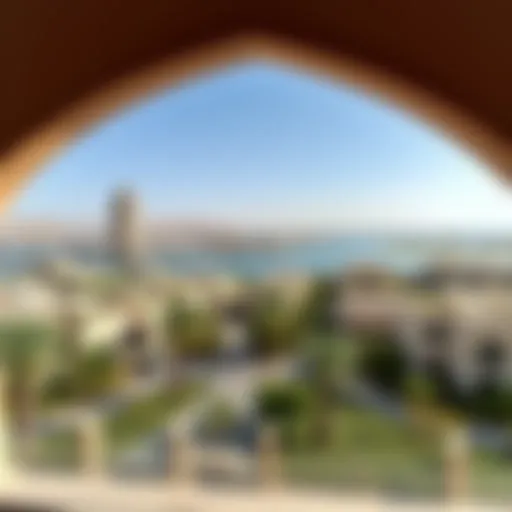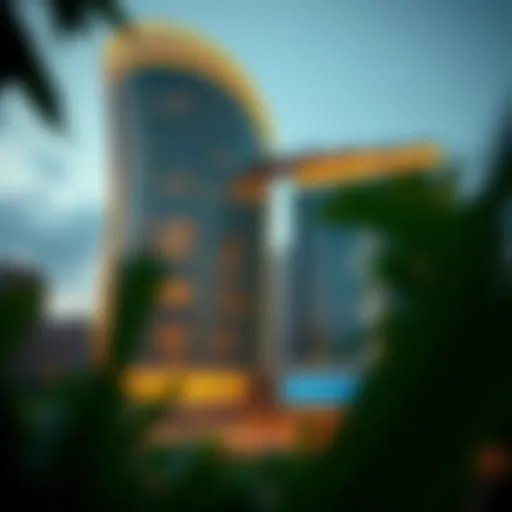Insights and Trends in Dubai's Residential Market
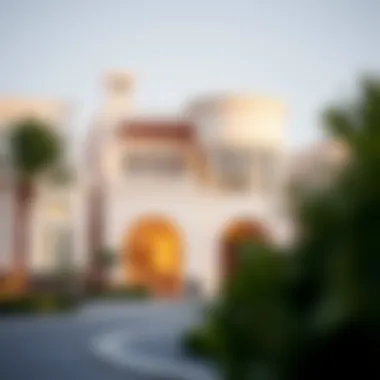

Intro
Dubai's residential market has become a hotbed for both seasoned investors and first-time homebuyers. With its stunning skyline and luxurious lifestyle, the city attracts people from all corners of the globe. Yet, beneath the glitzy facade lies a complex landscape of properties, market dynamics, and burgeoning opportunities. Understanding this unique ecosystem is not just beneficial; it's essential for making informed decisions in such a vibrant economy.
As one dives into the residential real estate sector in Dubai, it becomes clear that various factors come into play. Neighborhood characteristics, pricing strategies, along with financing options and future developments all weave together a narrative rich in complexity. In this article, readers will find a wealth of insights tailored for potential homeowners and investor alike. The aim is to equip them with the knowledge necessary to navigate diverse challenges, ensuring their property ventures are both rewarding and insightful.
The journey begins with an exploration of the market trends shaping Dubai’s real estate landscape. What does the current scenario look like? What might we anticipate in the future? Let’s peel back the layers and take a closer look, starting with the section on Market Trends.
Prolusion to Dubai's Real Estate Market
Dubai's real estate scene is akin to a kaleidoscope, showcasing a vibrant mix of opportunities that appeal to a wide array of buyers and investors. The region has rapidly evolved into a global epicenter for luxury, innovation, and diverse living options. Understanding this market is crucial, not just for those looking to invest, but even for those considering calling this dazzling city home.
One of the main aspects driving Dubai's real estate market is its strategic geographic position. Situated at the crossroads of Europe, Asia, and Africa, it serves as a gateway that attracts businesses and travelers from all corners of the globe. The economic developments and various government initiatives have further enhanced the appeal of Dubai; from hosting major events like the Expo 2020 to launching freehold ownership states for foreign investors, the market is ripe for exploration.
Investors are particularly attracted to the potential for high returns on investment, driven by a constantly growing expatriate population and a healthy rental market. Notably, properties in Dubai have shown resilience even in global downturns, symbolizing a secure investment, especially for those looking to gain footholds in emerging markets.
In addition to the economic factors, the unique lifestyle offerings are also noteworthy. Residents enjoy a wealth of amenities, including state-of-the-art facilities, vibrant cultural scenes, and prestige associated with living in iconic neighborhoods. Consideration of these facets is essential for anyone serious about engaging in Dubai's complex real estate landscape.
"Real estate in Dubai isn't just about bricks and mortar; it's about lifestyle and opportunities."
However, as enticing as it sounds, navigating this market does present its own set of challenges. Prospective buyers must be well-informed about legalities, financing options, and the intricacies of property management in the UAE. As we move forward in this article, we'll delve into the various types of residential properties available, explore notable residential areas, and analyze market trends that will provide essential insights for your property journey in Dubai.
Types of Residential Properties
The landscape of Dubai's real estate is as diverse as the city itself. This section delves into the various types of residential properties available and underscores their significance in understanding the market and making informed decisions. Knowing the distinct types of residences allows potential buyers or investors to find properties that align with their lifestyle, budget, and investment goals.
Apartments
Luxury Apartments
Luxury apartments in Dubai embody elegance and sophistication. These units often come with high-end finishes, stunning views, and a plethora of amenities. Key characteristics include spacious layouts, designer interiors, and facilities like infinity pools, spas, and 24-hour concierge services.
The appeal of luxury apartments isn't just about opulence; they often represent a status symbol and provide a unique lifestyle experience. Residents typically enjoy direct access to leisure and entertainment hubs, making them a popular choice for affluent buyers and investors seeking a lucrative return through rental opportunities.
However, one should consider the cost associated with such living spaces. Prices for luxury units can be steep, and while they may promise high returns, they also come with heightened responsibilities and maintenance costs. Still, the allure of upscale living often outweighs these downsides.
Affordable Housing Options
Not everyone in Dubai seeks the highlife. Affordable housing options provide a viable solution for first-time buyers or those on a budget. These properties are characterized by more economical price points, practical layouts, and community-oriented designs.
They bring significant benefits, like accessibility and ongoing urban development in their areas. Such properties cater mostly to middle-income earners and offer the chance to enter the market without excessive financial strain. Additionally, the demand for affordable housing is on the rise, making these options a smart choice from an investment perspective.
Nonetheless, potential buyers must consider that lower purchase prices can sometimes be accompanied by fewer amenities and community services. Balancing cost-effectiveness with desired features is crucial.
Penthouse Living
Penthouse living in Dubai is often synonymous with luxury and exclusivity. These high-rise homes sit atop skyscrapers and offer stunning panoramic views of the city skyline and coastline. Unique features of penthouses include expansive outdoor terraces, private pools, and bespoke interior designs.
Choosing a penthouse is a statement of lifestyle choice; it appeals to those who value luxury, privacy, and a unique living experience. The expansive space often allows for creative design opportunities, making them highly desirable among affluent buyers.
However, the advantages come at a price. Penthouses are often among the most expensive residential options available. Additionally, upkeep and maintenance can be significant, sometimes catching buyers off guard. Therefore, it is vital to weigh the perks against the costs before deciding.
Villas
Independent Villas
Independent villas showcase the ultimate in privacy and spacious living. These standalone homes usually feature extensive garden areas, private pools, and a sense of autonomy. This characteristic nature adds major appeal for families or those looking for extra room.
An independent villa often embodies a sense of community living without compromising personal space. Many are situated in gated communities that offer added security and a family-friendly atmosphere. This balance makes them especially enticing to those raising children or seeking a serene retreat from city life.
However, the higher price point can be a hurdle. The maintenance of larger spaces can also be more demanding, meaning buyers need to be prepared to manage landscaping and upkeep effectively.
Luxury Communities
Luxury communities in Dubai provide residents with an all-encompassing lifestyle experience, combining exclusive living with upscale amenities. These gated neighborhoods usually offer security, leisure facilities, and often community events.
Living in a luxury community often comes with social advantages, providing residents with an instant network and shared interests. The characteristics of these developments can make them stand out; beautifully designed with lush landscaping and services tailored for comfort and convenience.


That said, purchasing in such communities usually entails a premium price tag. While they foster a unique living experience, prospective buyers need to assess whether the added cost aligns with their budget and lifestyle needs.
Townhouses
Townhouses combine the spaciousness of a villa with the affordability of apartment living. These multi-story properties typically share walls with neighboring homes, allowing for a more efficient use of space. Townhouses often appeal to both families and professionals who desire a mix of community interaction and private living.
One of the main draws is the semi-autonomous living experience they offer—often equipped with small gardens, balconies, and community facilities nearby. This variety allows residents to enjoy some privacy while still being part of a community, making townhouses a popular choice in Dubai’s diverse real estate landscape.
That said, potential buyers should take into account that townhouses may offer less space compared to independent villas and often come with shared responsibilities for community upkeep.
Serviced Residences
Hotel Apartments
Hotel apartments present a hybrid option between traditional apartments and hotel living. This category serves as a comfortable choice for those looking for flexibility, whether as a short-term residence or a longer stay.
With amenities that rival some of the best hotels, these spaces typically provide service options like housekeeping, room service, and concierge help. The convenience factor appeals to busy professionals or expatriates who may need temporary housing while settling in.
However, the trade-off may be the lack of personal space or customization that comes with a private residence. Buyers should consider how living in a hotel apartment fits into their lifestyle and whether the amenities justify the associated costs.
Short-term Rentals
Short-term rentals have become a popular option in Dubai's vibrant real estate market, appealing to tourists and temporary residents alike. These properties allow owners to capitalize on the city's booming tourism industry, providing flexibility for both renters and landlords.
The key characteristic of short-term rentals is the potential for high return on investment, especially in areas with heavy tourist traffic. Owners can often earn more in a short time compared to long-term rental contracts. This enables property owners to diversify their portfolio while providing essential accommodation options for visitors.
Nevertheless, short-term rentals come with significant management demands. Owners need to juggle bookings, maintenance, and guest relations, which can be time-consuming. Additionally, fluctuating regulations surrounding short-term rentals can pose risks. Hence, prospective investors should fully grasp the dynamics of the market before diving in.
Understanding the diverse types of residential properties in Dubai is critical for buyers and investors navigating the market effectively. Each type offers its own benefits and considerations, tailored to different lifestyles, needs, and financial capabilities.
Prominent Residential Areas
In the bustling real estate landscape of Dubai, understanding the prominent residential areas is crucial. This knowledge aids potential buyers and investors in identifying suitable locations that meet their needs and preferences. Each area offers its unique charm, amenities, and market dynamics, influencing property values and investment opportunities.
Among Dubai's real estate sectors, specific neighborhoods stand out due to their popularity, lifestyle offerings, and growth potential. Recognizing these residential hubs can lead to well-informed decisions regarding both purchasing and investment strategies.
Downtown Dubai
Key Developments
Downtown Dubai often stands at the forefront of the city’s rapid growth. One of its hallmark features is the Burj Khalifa, the tallest building in the world, which attracts tourists and residents alike. The area is punctuated by upscale developments like the Address Residence Fountain Views, which combines luxurious living with stunning views. These key developments are not merely about aesthetics; they encapsulate modern urban living, making it a favorable choice for both residents and investors.
The unique design and strategic location make buildings in Downtown Dubai appealing for those looking to enjoy a vibrant city life. Additionally, the integration of mixed-use spaces offers convenience, as residents can access retail outlets, dining, and entertainment right at their doorstep. However, with increasing popularity comes higher pricing. This means potential buyers should weigh their options carefully, considering both the allure and the associated costs.
Attractions and Amenities
In Downtown Dubai, attractions are abundant. The Dubai Mall, known as one of the world's largest shopping centers, provides an endless array of retail options and leisure activities. Beyond shopping, residents can enjoy artistic experiences at the Dubai Opera or witness the enchanting Dubai Fountain.
Accessibility is another key characteristic of this area. With efficient public transport links and major thoroughfares nearby, commuting is a breeze. However, the vibrant atmosphere can come with noise and crowd challenges, particularly during peak tourist seasons. Potential residents should consider these factors when evaluating whether this area aligns with their lifestyle preferences.
Dubai Marina
Coastal Living
Dubai Marina is renowned for its stunning waterfront views and luxurious lifestyle. This area provides an environment where residents can enjoy the serenity of coastal living while being close to the city's vibrant core. The marina itself features a prominent promenade that attracts joggers, cyclists, and families, creating a bustling yet relaxed community atmosphere.
One of the appealing aspects of living in Dubai Marina is its variety of housing options, accommodating everyone from small families to single professionals. Though properties here often come with premium pricing, many believe the investment equals the lifestyle benefits. Residents who appreciate a dynamic social scene or outdoor activities will find ample opportunities here.
Community Features
Community features in Dubai Marina contribute significantly to its appeal. Many residential buildings offer amenities such as gyms, pools, and communal spaces. The presence of high-end restaurants and cafes along the waterfront enhances the neighborhood's social fabric, making it a desirable locale for gatherings.
Additionally, the strong community support—ranging from recreational clubs to neighborhood events—fosters a sense of belonging among residents. However, it’s worth noting that, with the growing population, traffic can be an issue. Buyers must balance the benefits of close-knit community features with the hustle and bustle that may arise from increased density.
Palm Jumeirah
Iconic Landmarks


The Palm Jumeirah represents opulence and exclusivity in Dubai’s residential landscape. One of the world’s largest man-made islands, it offers unique, luxury properties that are unlike anything else. This area is marked by not only stunning villas and apartments but also iconic attractions like Atlantis, The Palm—a resort that features an aquarium and waterpark, drawing in visitors year-round.
Living here is often seen as a status symbol. Buyers appreciate both the architectural brilliance of the island and its distance from the city hustle, providing a serene, beach-oriented lifestyle. While these benefits are attractive, potential buyers should consider the surrounding commercial activity that can sometimes detract from the tranquility.
Residential Options
On the Palm, residential options are diverse, ranging from lavish villas to modern apartments. Each unit typically offers breathtaking views of the sea or the Dubai skyline—a characteristic that is a top draw for many prospective buyers. The luxury lifestyle here also comes with high prices, placing it out of reach for many, but serving as a worthwhile investment for others.
Residents benefit from amenities such as private beaches and exclusive clubs, which enhance the living experience. However, potential challenges include the often high costs associated with maintenance and living in such a premium setting. Therefore, interested homebuyers need to take a thorough look at their finances and expectations when considering a move to this unique area.
Market Trends and Insights
Understanding the market trends and insights within Dubai's real estate scene is paramount for anyone contemplating a move, investment, or even just a casual interest in the city's unique blend of modernity and tradition. The shifting dynamics of this vibrant market influence not just prices, but also the type of properties that catch the eye of buyers and investors alike.
Keeping a finger on the pulse of the market means knowing how to navigate through the tide of demand and supply, spotting opportunities before they blossom, and making informed decisions based on current data rather than guesswork. The nuances of timing can drastically alter one's financial landscape, making the knowledge of these trends crucial.
Current Market Dynamics
Dubai's real estate market is marked by its rapid transitions. It's not just about whether prices are on the rise or fall; it's also about the underlying factors driving these changes. Various elements like economic conditions, demographic shifts, and even global tourism statistics come into play. Currently, there seems to be a propelling force in the market as expatriates increasingly see Dubai as a long-term residence versus a temporary assignment. More buyers long for vibrant neighborhoods with amenities that cater to an upscale lifestyle, reflecting a cultural shift in living preferences. The emergence of new projects and neighborhoods is shaping the landscape and creating a buzz that potential homeowners and investors can certainly benefit from.
Investment Opportunities
Emerging Areas
Emerging areas in Dubai often present golden opportunities for those looking to invest. Neighborhoods like Dubai South and Dubailand have captured attention due to their affordability and potential for future growth. A significant characteristic of these areas is their development plans, backed by government initiatives that project long-term benefits.
A unique feature of these locations is their accessibility, with developments in transportation making commuting easier. This has increased their appeal, especially among younger families. While there are undeniable advantages, prospective investors need to be cognizant of the risks associated with emerging areas, such as uncertainty regarding future infrastructure or demand.
Government Initiatives
Government initiatives play a vital role in shaping the real estate landscape. Programs aimed at facilitating foreign ownership and investment incentives make Dubai an attractive market. The introduction of visa reforms and reduced property transfer fees further entice buyers. This strategy not only attracts wealth from abroad but also enhances the overall image of Dubai as a global real estate hub.
One key characteristic of government support is its responsiveness to market changes. The ability to adapt policies and create appealing investment conditions has been a game changer. However, it's crucial for investors to remain updated on regulatory changes to fully leverage available opportunities while being mindful of any potential constraints.
Pricing Trends
Comparison of Property Types
When contemplating investment, understanding the comparison between different property types is essential. Luxury apartments usually command higher prices due to their premium locations and amenities, meanwhile affordable housing options present excellent value for first-time buyers. Another characteristic worth noting is the varied return on investment across these property types. Investors targeting rental yields might find that affordable units perform better during periods of market volatility.
A unique aspect of the real estate market here is the saturation that can occur in certain segments, affecting pricing strategies. Higher-end properties may struggle during economic downturns while budget-friendly housing remains in demand, making it a cornerstone for investors to consider diverse portfolios.
Long-term vs Short-term Rentals
Diving into the long-term versus short-term rental market reveals distinct advantages and setbacks. Long-term rentals offer stability and consistent income, appealing to those seeking to minimize risk. Properties in well-established neighborhoods often attract tenants looking to settle down, thus providing steady cash flow.
On the other hand, short-term rentals, often magnified by platforms like Airbnb, can yield higher profits in favorable tourist seasons. However, they come with their own set of challenges, such as the need for active management and potential regulatory restrictions. Understanding the market's ebb and flow can drastically influence profitability in both scenarios, creating a complex yet fascinating layer for real estate enthusiasts to explore.
Financing and Purchasing Processes
Understanding the financing and purchasing processes is a crucial aspect in navigating Dubai's vibrant real estate market. These processes not only dictate how buyers can acquire property but also outline the necessary steps one must follow to secure a residence. With various options available, potential homeowners and investors need to comprehend the distinctions between financing avenues, legal stipulations, and what financial considerations to keep in mind.
Mortgage Options
Local Banks
When considering mortgage options in Dubai, local banks emerge as a significant player. They provide tailored mortgage solutions that cater to the needs of residents and citizens alike. The main characteristic of local banks is their deep understanding of the Dubai property market, which can certainly facilitate the lending process for potential buyers. Many locals prefer these banks due to their familiarity with the regional regulations and the streamlined service they offer.
A unique feature of these institutions is the provision of financing at competitive interest rates, often tailored with specific packages that make home ownership more accessible. The advantage here is the ability to negotiate terms that are better suited to the buyer's financial situation, and the local edge they have in processing applications quickly. However, those unfamiliar with local banking norms may find the documentation process somewhat tedious, as it often requires a comprehensive array of financial disclosures.
Foreign Investor Options
On the flip side, foreign investors may be curious to learn about their financing options within the Dubai market. International banks and mortgage lenders catering to expats have sprung up, providing a vital alternative. One notable characteristic of these options is flexibility; many foreign investors look for seamless transactions that do not require convoluted local credit history.
The granting of mortgages to foreign buyers is a popular choice because these lenders may offer attractive rates and lower upfront costs, possibly facilitating access to prime properties. Additionally, they can provide solutions tailored specifically to non-residents, simplifying procedures. On the downside, they might lack the personalized touch of local banks, and applicants may face slightly higher interest rates due to perceived risk.
Legal Considerations
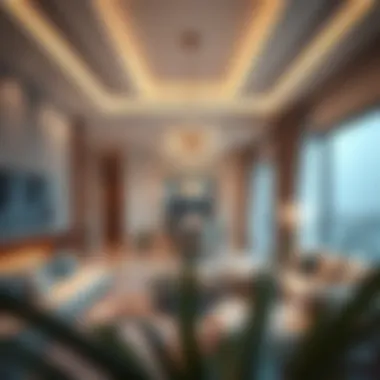
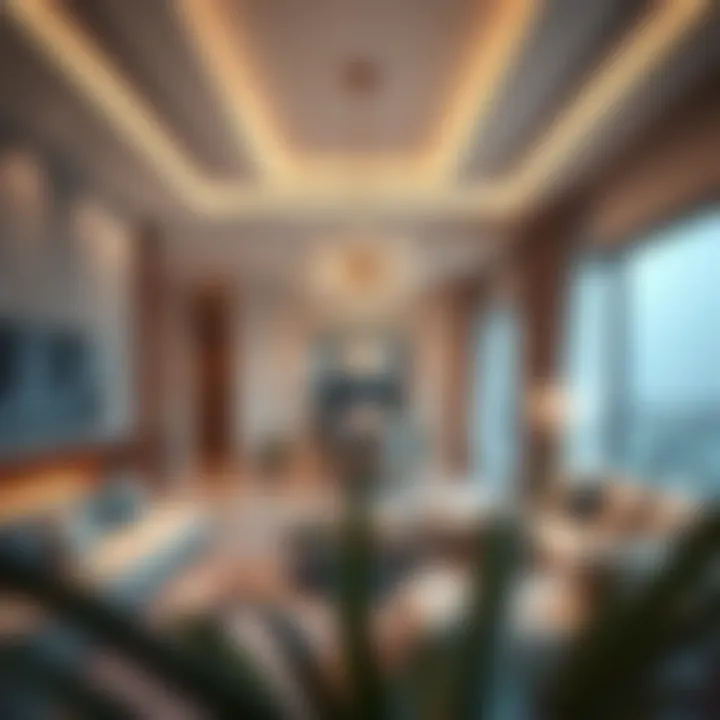
Ownership Laws
Navigating ownership laws in Dubai is paramount for anyone looking to invest in the property market. These laws dictate who can own property and what restrictions may apply, especially for foreign buyers. A key characteristic of ownership laws in Dubai is the difference between freehold and leasehold properties. Freehold properties allow for outright ownership, while leasehold usually involves long-term leases, often pegged to land owned by a local entity.
Understanding these nuances is beneficial as they affect investment opportunities and resale potential. Another unique aspect is that foreign nationals can fully own property in designated freehold areas, providing a significant upside to overseas investors. However, this is coupled with certain risks; understanding the local regulations fully is vital, as missteps can lead to significant financial loss.
Transfer Fees
Transfer fees represent another critical financial consideration when purchasing property in Dubai. This fee is typically a percentage of the property's purchase price and is payable upon the transfer of ownership. A notable characteristic of transfer fees is their predictability; the standard rate is usually around 4% of the property value, which helps prospective buyers gauge their overall expenditure. This simplicity serves as a beneficial factor when calculating total investment costs.
The unique feature of these fees is their role in ensuring that the sale is legally binding and secure. However, buyers should be mindful as these fees can accumulate quickly, often influencing their budget or financing route.
In summary, grasping the intricacies of financing and purchasing processes is vital for a successful property transaction in Dubai. Both local banks and foreign investor options each present advantages and challenges, while adherence to ownership laws and awareness of transfer fees are essential in navigating the legal landscape seamlessly.
Future Developments and Prospects
In the ever-evolving landscape of Dubai's real estate, understanding future developments and prospects is crucial for investors and homebuyers. This section dives into what's on the horizon, shedding light on projects and trends that can shape the market trajectory. With continual growth and transformation in the city, staying informed about upcoming changes allows potential buyers to make savvy choices and leverage opportunities that may arise.
Upcoming Projects
Major Upcoming Developments
Dubai is abuzz with numerous major upcoming developments that promise to redefine its skyline and lifestyle. One prime example is the Dubai Creek Tower, which aims to surpass the Burj Khalifa as the tallest structure globally. This project represents a bold push into innovative architecture, signaling not just a building, but a statement about the city’s ambition and vision.
Another noteworthy project is the Dubai Harbour, a massive waterfront destination that combines residential spaces with leisure and hospitality. This venture is designed to cater to both locals and tourists, thus bolstering property value and enhancing community life.
The key characteristic of these major developments is their community-centric approach. Developers are focusing more on creating spaces that foster a sense of belonging and interactiveness among residents. This shift towards community engagement makes these projects highly desirable for families and young professionals alike.
However, the unique feature of these upcoming developments often lies in their sustainability efforts, integrating green spaces and eco-friendly technologies. While the allure of these projects is evident, potential drawbacks include the challenges of managing construction timelines and ensuring the market absorption of new units, which requires careful planning and investment strategies.
Projected Market Impacts
The projected market impacts of these developments are significant and multifaceted. As new projects come online, they can drive a surge in real estate prices, especially in adjacent areas. This fact makes awareness of these impacts essential for any investor looking to maximize their return on investment.
Key impacts involve increased employment opportunities, arising from construction and future business expansions in the area. Furthermore, as these new properties become available, they will likely attract a more affluent demographic, which can change the neighborhood’s landscape, making it more vibrant and competitive.
Moreover, these developments can shift the supply-demand balance in Dubai. If too many properties flood the market without corresponding demand, prices may stabilize or decline, affecting investor sentiments. Thus, assessing potential market saturation becomes critical for stakeholders. Understanding these dynamics can empower buyers to strategically time their entry into the market or identify potentially lucrative opportunities.
Sustainability Trends
With sustainability becoming a cornerstone of urban planning globally, Dubai is no exception. Future developments reflect this significant trend, leading to innovative practices as real estate evolves.
Green Buildings
The concept of green buildings takes center stage in Dubai's future residential framework. These constructions adhere to strict environmental standards, employing energy-saving technologies and eco-friendly materials. Projects like the The Sustainable City notably implement solar power and water recycling—apt illustrations of how Dubai is committed to eco-consciousness.
One key characteristic of green buildings is their operational efficiency. By utilizing renewable resources and innovative design, these structures can significantly reduce long-term operating costs for homeowners. The environmental benefits are accompanied by a growing preference among buyers for sustainable living spaces, making green buildings increasingly attractive.
However, while the advantages of investing in such properties are compelling, challenges remain. Initial construction costs can be higher due to specialized design and materials, which may be a barrier for some potential buyers.
Smart City Initiatives
Dubai is well-known for its smart city initiatives, which aim to integrate technology into daily living, creating more efficient urban experiences. Projects like Smart Dubai put emphasis on digital governance, improving accessibility through interconnected services and smart infrastructure.
The uniqueness of these initiatives lies in their utilization of data analytics to enhance living standards. From traffic management to smart utilities, these technologies offer remarkable benefits, making urban life more convenient. This shift not only elevates the quality of life for residents but also attracts technology-driven investments to the region, establishing Dubai as a tech-forward destination.
Despite the positives, a potential downside is the reliance on technology, which can lead to vulnerabilities—such as cybersecurity threats that may arise from increasing digitization.
Being forward-thinking in real estate allows individuals to harness the potential of upcoming trends, ultimately enriching their investment experience.
The End
In wrapping up the exploration of Dubai's residential sector, it's imperative to emphasize how this dynamic market shapes investment decisions and lifestyle choices. With a diverse range of properties that cater to various demographics, this city stands out as a hub for both homebuyers and investors alike. The landscape is ever-evolving, and understanding these intricacies is paramount.
Key Takeaways:
- Diverse Property Types: From luxury apartments in Downtown Dubai to serene villas in Jumeirah, the variety provides numerous options tailored to different preferences and budgets.
- Market Trends: Staying informed about current market trends can provide a significant edge to potential investors. The demand for sustainable living and innovative designs is steering future developments.
- Financing: The complexity of financing options comes into play, especially for foreign investors. Exploring the legal nuances and mortgage options can save buyers from unnecessary hurdles.
- Future Outlook: Anticipating upcoming projects and understanding government initiatives can spotlight lucrative investment opportunities that may otherwise go unnoticed.
"The shift in Dubai's residential landscape is not just about buildings; it's about creating vibrant communities where people thrive."
The importance of a robust conclusion in this article lies in synthesizing the knowledge shared, allowing readers to grasp the larger picture. It connects the dots, guiding potential homeowners and investors in making informed decisions amid a complex market. As the city continues to grow, understanding these factors becomes not just beneficial but essential for making savvy property decisions. For those eager to delve into Dubai's real estate, this guide serves as a foundational tool, shedding light on critical aspects to consider before taking the plunge.
By keeping abreast of developments and trends within this vibrant city, stakeholders can navigate the landscape with confidence, paving the way to profitable ventures in the ever-evolving Dubai real estate market.
For those interested in furthering their understanding, resources like Wikipedia, Britannica, and local government sites provide valuable insights into regulations and market statistics.




